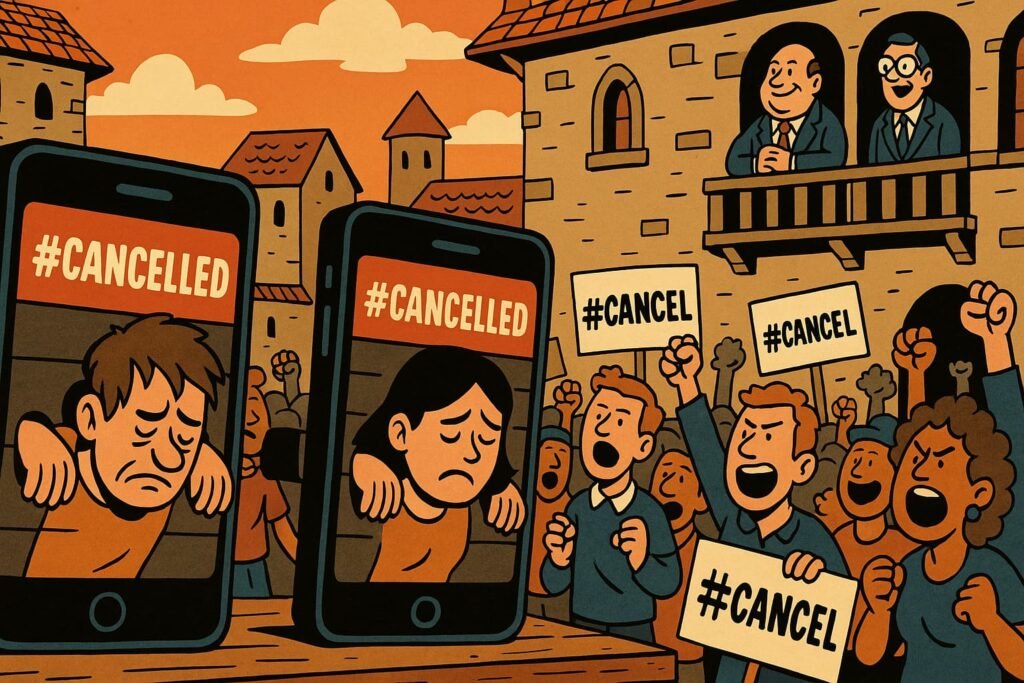Cancel Culture Explained: From Accountability to Mob Rule
When Boycotts Became Excommunications
Once, “accountability” meant facing consequences for real misconduct. Today, it means losing your job, reputation, or platform because you said the wrong thing — or nothing at all.
Cancel culture is the weaponised outrage machine: public shaming amplified by media, enforced by institutions, and monetised by activists.
It isn’t justice. It’s mob rule with hashtags.
Table of contents
What Is Cancel Culture?
In simple terms, cancel culture is the practice of punishing people — often through boycotts, campaigns, or public shaming — for opinions, jokes, or associations deemed offensive.
The goal isn’t debate. The goal is silence.
Buzzwords of Cancel Culture
The movement comes with its own coded language:
- “Accountability” – punishment without process.
- “Problematic” – a catch-all for anything unpopular with activists.
- “Platforming” – giving someone oxygen is treated as complicity.
- “Do better” – the ritual demand for apology.
- “Silence is violence” – neutrality reframed as guilt.
The words sound constructive. They function as weapons.
How Cancel Culture Shows Up in Practice
- In Media: Writers dropped, shows cancelled, comedians blacklisted. J.K. Rowling, once untouchable as the author of Harry Potter, became the “Queen of Transphobia” for questioning gender ideology. Dave Chappelle faced boycotts for his comedy.
- In Workplaces: Employees fired for tweets, jokes, or private conversations — from junior staff to senior executives.
- In Politics: Opponents delegitimised through online mobs. Donald Trump was deplatformed from Twitter and Facebook.
- In Academia: Speakers disinvited, research suppressed. Jordan Peterson, Bret Weinstein, and others were hounded by campus outrage.
- In Everyday Life: Ordinary people dragged online for offhand comments — sometimes even for liking the “wrong” post.
The process is always the same: accusation → outrage → apology → exile.
Why Institutions Promote It
Because fear is cheap control.
- Corporations cave instantly to avoid PR crises.
- Universities enforce speech codes to pacify activists.
- Media thrives on clicks from outrage storms.
- NGOs and activists build careers as professional cancellers.
Cancel culture punishes individuals, but it benefits institutions.
The Consequences
- Free speech shrinks. People censor themselves to avoid being targeted.
- Debate dies. Offence replaces argument.
- Careers ruined. Punishment is permanent, apologies never enough.
- Fear spreads. Ordinary people watch and stay silent.
Instead of accountability, society gets intimidation.
Why It Matters
Cancel culture isn’t about justice. It’s about power: who gets to speak, who doesn’t, and who profits from outrage.
When mobs replace debate, and institutions reward fear, democracy itself becomes performative.
From Accountability to Mob Rule
Cancel culture promised accountability. It delivered fear.
The case of J.K. Rowling shows the logic perfectly: a world-famous author, worth billions to publishers, can be cast out overnight for saying women exist as a biological category. If Rowling isn’t safe, who is?
Behind the hashtags and statements lies the oldest form of control: make an example of one, and the rest fall in line.
FAQ
What is cancel culture in plain terms?
It’s the practice of punishing people for opinions, words, or actions deemed offensive, often through public shaming.
Why is cancel culture controversial?
Because it punishes without process, silences debate, and enforces conformity.
Where does cancel culture show up?
In media, workplaces, universities, politics, and social media.
Who benefits from cancel culture?
Activists, media outlets, and institutions that gain clicks, money, or control from outrage.
How does cancel culture link to hate speech and DEI?
It overlaps with Hate Speech Laws, feeds corporate DEI policies, and reinforces Inclusion.



